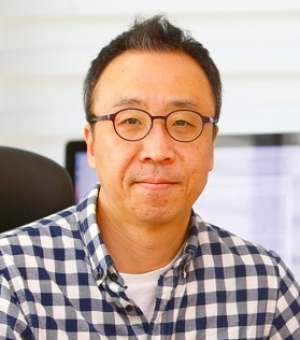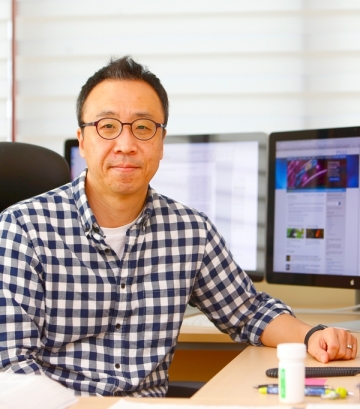신근유 Shin, Kunyoo
우리 연구실은 노화를 비롯한 암질환 및 뇌질환 등의 다양한 난치성 인체질환의 발생 기작 규명 및 이를 바탕으로 한 궁극적 치료법을 개발하는 연구를 진행하고 있습니다. 특히, 1) 기존에 존재하는 신약개발 플랫폼의 한계를 극복하고 여러 난치성 질환 치료 신약 개발을 가능하게 하는, 줄기세포 기반의 최첨단 휴먼 오가노이드/어셈블로이드 개발, 2) 인체 미니장기를 기반으로 뇌질환, 암질환 등의 난치성 질환 발생 기작 규명, 그리고 3) 인공배아 기술, 생체 내 세포 reprograming 및 rejuvenation기술을 기반으로 지금껏 존재하지 않던 노화 및 다양한 난치성 인체질환의 궁극적 조직재생 치료법을 연구 개발하고 있습니다. 현재 구체적으로는 아래의 3가지 분야에 관심을 가지고 연구를 진행하고 있습니다.
1) In vivo cellular reprograming/rejuvenation 및 인공배아 (embryoid, blastoid, somatoid, etc) 연구를 통한, 노화 및 다양한 난치성 인체질환의 궁극적 치료법인 life extension therapy 연구
2) 환자 특이 휴먼 브레인 오가노이드/어셈블로이드 모델을 연구 개발하고, 이를 통해 조현병, 자폐증, 치매 등의 다양한 인간 질환 뇌에서의 뇌세포와 주변 세포 간의 상호작용이 뇌질환 발생에 미치는 영향 규명 및 치료법 개발
3) 환자유래 인공 종양 어셈블로이드 모델 및 환자 특이 아바타 마우스 구축을 통한 암 조직 내에서의 암세포와 면역세포 및 암 주변 미세환경과의 상호작용이 다양한 암발생에 미치는 영향 규명 및 환자 맞춤형 항암 세포치료제와 면역항암제 개발
학력
- - 2001-2006 Ph.D., University of Michigan Medical School
- - 1998-2000 M.S., Korea University
- - 1991-1998 B.A., Korea University
경력
- - 2025-current Professor, Seoul National University
- - 2022-2025 Associate Professor, Seoul National University
- - 2016-2022 Associate Professor, Pohang University of Science and Technology (POSTECH)
- - 2014-2016 Assistant Professor, Oregon Health & Science University (OHSU) School of Medicine
- - 2007-2014 Instructor, Howard Hughes Medical Institute (HHMI), Stanford University School of Medicine
- - 2006-2007 Postdoctoral fellow, Harvard University
- Kim Y, Kim I, Shin K. A new era of stem cell and developmental biology: from blastoids to synthetic embryos and beyond. EMM. 2023 Oct 2. doi: 10.1038/s12276-023-01097-8.
- Kong J, Ha D, Lee J, Kim I, Park M, Im S, Shin K, Kim S. Network-based machine learning approach to predict immunotherapy response in cancer patients. Nat Commun. 2022 June 28;13(1): 1-15.
- Kim E, Choi S, Kang B, Kong J, Kim Y, Yoon WH, Lee HR, Kim S, Kim HM, Lee H, Yang C, Lee Y, Kang M, Roh TY, Jung S, Kim S, Ku J, Shin K. Creation of bladder assembloids mimicking tissue regeneration and cancer. Nature. 2020 Dec 16. doi: 10.1038/s41586-020-3034-x.
- Kong J, Lee H, Kim D, Han SK, Ha D, Shin K*, Kim S*. Network-based machine learning in colorectal and bladder organoid models predicts anti-cancer drug efficacy in patients. Nat Commun. 2020 Oct 30;11(1):5485 *Co-corresponding authors.
- Yoon WH, Lee HR, Kim S, Kim E, Ku J*, Shin K*, Jung S*. Use of inkjet-printed single cells to quantify intratumoralheterogeneity. Biofabrication. 2020 June 29; 12(3) Epub. *Co-corresponding authors.
- Kim S, Kim Y, Kong J, Kim E, Choi JH, Yuk HD, Lee H, Kim HR, Lee KH, Kang M, Roe JS, Moon KC, Kim S, Ku JH, Shin K. Epigenetic regulation of mammalian Hedgehog signaling to the stroma determines the molecular subtype of bladder cancer. eLIFE. 2019 Apr 30;8 Epub.
- Lim A^*,Shin K^*, Zhao C, Kawano S, Beachy PA*. Spatial organization of Hedgehog signaling regulates adult prostate branching via Hgf. Nat. Cell. Biol. 2014 Nov 2;Epub. *Co-corresponding authors.
- Shin K*, Lim A, Zhao C, Pan Y, Liao JC, Beachy PA*. Protective effect of stromal response to Hedgehog signaling in bladder cancer. Cancer Cell. 2014 Apr 20; Epub. *Co-corresponding authors.
- Shin K*, Lim A, Odegaard JI, Honeycutt JD, Kawano S, Hsieh MH, Beachy PA*. Cellular Origin of Bladder Neoplasia and Tissue Dynamics of its Progression to Invasive Carcinoma. Nat. Cell Biol. 2014 May;16(5):469-78. Highlighted in Nat. Rev. Cancer. 2014 Jun;14(6):386-7. *Co-corresponding authors. Highlighted in Nat. Rev. Urol. 2014 Jun;11(6):302.
- Shin K*, Lee J, Guo N, Kim J, Lim A, Qu L, Mysorekar IU, Beachy PA*. Hedgehog/Wnt Feedback Supports Regenerative Proliferation of Bladder Stem Cell. Nature. 2011 Apr 7;472(7341):110-4. *Co-corresponding authors. Recommended by Faculty of 1000.



